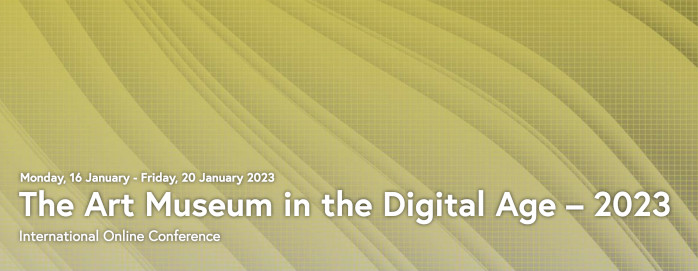The Art Museum in the Digital Age – 2023
The Belvedere Research Center continues its conference series on digital transformation of art museums with its fifth anniversary event on this crucial subject. The focus of this event is on the metaverse, an embodied virtual-reality experience, and its connection to cultural institutions. The term ‘metaverse’, coined by Neal Stephenson in his sci-fi novel Snow Crash (1992), came into wider consciousness when Mark Zuckerberg renamed Facebook as Meta in 2021 and proclaimed that he wished to focus on developing the metaverse. According to experts, the development of the metaverse is still decades away due to the lack of technological capacity. Definitions of the metaverse are therefore diverse, ranging from “collective space in virtuality” to an “embodied internet”, as well as a “place of simulation and collaboration”. What all these definitions have in common, however, the increasing demand for immersive experience between virtuality and reality, as well as the merging of networks. While some understand the metaverse as a mere buzzword, a marketing gimmick, and a way of merchandising a 1990s idea, others call it “one of the key trends of the future” that will revolutionize everything (Matthew Ball), and claim its adoption as “necessary”.
The technologization of everyday life, catalyzed by the global COVID-19 pandemic was instrumental in shifting the metaverse debate from the pioneers of industry (gaming, crypto, fashion) to the cultural realm. The Belvedere itself proclaimed a “successful entry into the metaverse” with the launch of the NFT of Gustav Klimt’s The Kiss, while Sotheby’s created a virtual gallery in Decentraland to exhibit and sell NFTs. However, these isolated projects remain detached from the sparse research studies to date. The aim of our forthcoming conference is to give an initial impetus for critical examination of the metaverse in the cultural field. We seek to stimulate discussion about the position of cultural institutions in the metaverse. What should an art museum in the metaverse look like? What role should it play? Which aspects of the metaverse, such as augmented, virtual reality and NFTs, should be pursued as a priority in the cultural sector? And how will these developments affect the social role of museums in the coming years?
As with any innovation, there are both challenges and opportunities related to the metaverse. Its development is driven primarily by powerful, profit-oriented technological corporations such as Meta (formerly Facebook), Alphabet (Google) and Microsoft. The interests of cultural institutions have received little attention, which raises questions about the advantages and disadvantages of working with corporate giants and the search for (non-profit) alternatives. The gaming industry, for example, could serve as a fruitful source of inspiration which could initiate new riveting aspects in museum digital art education. Meanwhile, companies like Nike and Balenciaga have already recognized the potential of such games and are making high profits from the sale of digital goods. Should museums follow such examples and prioritize selling their own digital products? How would such a step affect the growing tension between e-commerce and open-access movements? Such costly but long-term crucial innovations could also exacerbate the existing digitization gap between larger and smaller museums. In other words, how can we ensure that the diversity of the cultural scene in the real world is preserved in the digital world?
Over four evenings, our forthcoming online conference will present interdisciplinary contributions to broader questions relating to the metaverse which primarily – but not exclusively – reflect critically on the following issues:
The construction and deconstruction of the term metaverse and the associated value discussion, especially in relation to the cultural sphere;
The relationship between e-commerce and open-access movements;
VR/AR/XR applications in the museum;
overcoming digital boundaries and interoperability, Linked Open Data;
interactive art education in the digital world and in the metaverse, gamification;
NFTs and the role of museums in the digital art market;
innovative forms of immersion, participation;
artificial intelligence and machine learning; and
digitization opportunities for smaller institutions.
We look forward to receiving your proposals in the fields of museum/ museology, art and cultural history, media studies and the digital humanities. Please send your abstracts for a 20- to 25-minute presentation in German or English (max. 250 words), including a short biography with complete contact information as one PDF document by 16 October 2022 to [email protected].
We are delighted that Prof Johanna Drucker (University of California, Los Angeles) will be our keynote speaker.
Conference Committee: Johanna Aufreiter, Christian Huemer, Anna-Marie Kroupová (Belvedere, Vienna), Johanna Drucker (University of California, Los Angeles), Sonja Gasser (University of Bern), Harald Klinke (Ludwig Maximilian University of Munich).
Conference languages: English and German
Conference partners: ICOM Austria, Austrian Museums Association
All presentations will be online. The keynote lecture and the panel discussion, as well as an additional workshop for registered participants (Friday) will be held on site in the Belvedere, Vienna. Participation in the conference is free of charge.

